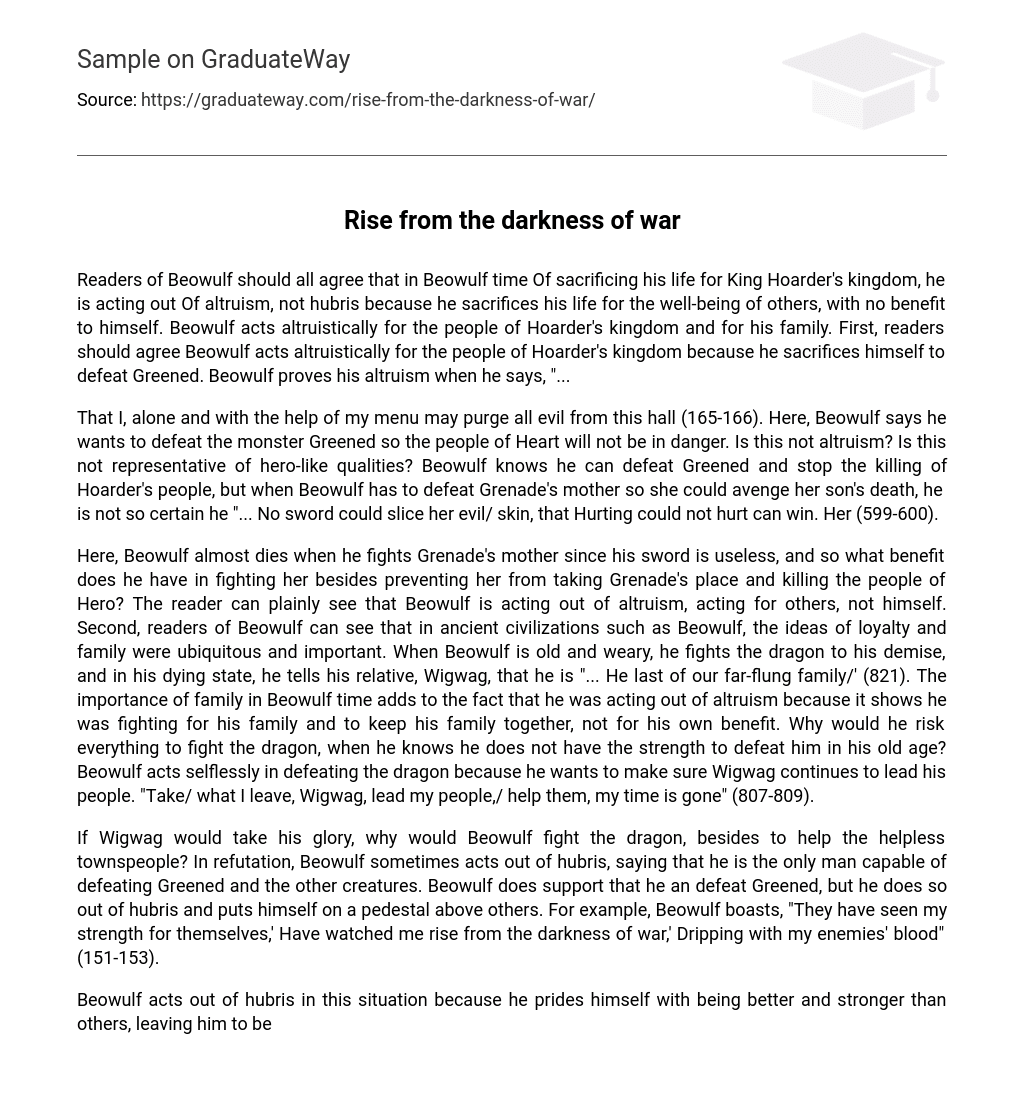Readers of Beowulf should all agree that in Beowulf time Of sacrificing his life for King Hoarder’s kingdom, he is acting out Of altruism, not hubris because he sacrifices his life for the well-being of others, with no benefit to himself. Beowulf acts altruistically for the people of Hoarder’s kingdom and for his family. First, readers should agree Beowulf acts altruistically for the people of Hoarder’s kingdom because he sacrifices himself to defeat Greened. Beowulf proves his altruism when he says, “…
That I, alone and with the help of my menu may purge all evil from this hall (165-166). Here, Beowulf says he wants to defeat the monster Greened so the people of Heart will not be in danger. Is this not altruism? Is this not representative of hero-like qualities? Beowulf knows he can defeat Greened and stop the killing of Hoarder’s people, but when Beowulf has to defeat Grenade’s mother so she could avenge her son’s death, he is not so certain he “… No sword could slice her evil/ skin, that Hurting could not hurt can win. Her (599-600).
Here, Beowulf almost dies when he fights Grenade’s mother since his sword is useless, and so what benefit does he have in fighting her besides preventing her from taking Grenade’s place and killing the people of Hero? The reader can plainly see that Beowulf is acting out of altruism, acting for others, not himself. Second, readers of Beowulf can see that in ancient civilizations such as Beowulf, the ideas of loyalty and family were ubiquitous and important. When Beowulf is old and weary, he fights the dragon to his demise, and in his dying state, he tells his relative, Wigwag, that he is “… He last of our far-flung family/’ (821). The importance of family in Beowulf time adds to the fact that he was acting out of altruism because it shows he was fighting for his family and to keep his family together, not for his own benefit. Why would he risk everything to fight the dragon, when he knows he does not have the strength to defeat him in his old age? Beowulf acts selflessly in defeating the dragon because he wants to make sure Wigwag continues to lead his people. “Take/ what I leave, Wigwag, lead my people,/ help them, my time is gone” (807-809).
If Wigwag would take his glory, why would Beowulf fight the dragon, besides to help the helpless townspeople? In refutation, Beowulf sometimes acts out of hubris, saying that he is the only man capable of defeating Greened and the other creatures. Beowulf does support that he an defeat Greened, but he does so out of hubris and puts himself on a pedestal above others. For example, Beowulf boasts, “They have seen my strength for themselves,’ Have watched me rise from the darkness of war,’ Dripping with my enemies’ blood” (151-153).
Beowulf acts out of hubris in this situation because he prides himself with being better and stronger than others, leaving him to be the only person capable of defeating Greened. When Unfetter challenges Beowulf, he acts out of hubris again when he says, “… No strength is a match for mine” (267). Beowulf has excessive self-confidence in his situation, because he has no doubt whatsoever about defeating Greened. But does Beowulf defeat Greened for his own personal gain? The answer is distinct, he is only acting for the benefit of Hoarder’s kingdom and the people of Hero.
Although some people may think that he defeats Greened out of hubris because he acts arrogantly when saying why he is capable of defeating Greened, he IS really just making sure Warthogs lets him defeat Greened for the lives of the people of Hero. Often in life, a person goes through experiences that teach them a lesson. Because Madison gives up her Seat, he learns it is better to give than receive. Because David lets a freshman play in his place, he learns that seeing someone else’s smile can make him happier than his own.
Because Julie spends her time tutoring a classmate, she made a friend and learned sacrifices are good in the long run. All three, although they made different sacrifices, learned that benefiting others benefits yourself. Similarly, Beowulf, although it seemed he was acting for himself, defeated Greened and his mother for the sake of the people of Hero and in turn became a famed leader. A person will learn this as a child, when he leaves his Rene beans on the plate and his mother says, “There are children who are starving in Africa. He will not know what this means until he grows older, but when he sees a soup kitchen or a homeless shelter for the first time, he will. By volunteering at a soup kitchen, he gives people food that cannot afford It and in turn receives community service hours, benefiting both himself and others. A person learns in life that things do not always go his way. For example, he will sometimes get the short end of the stick. If everything was fair in life, there would be no such thing as poverty.





